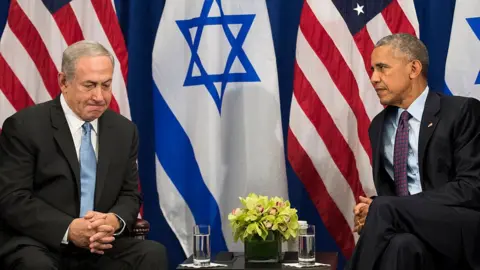Israel-Gaza: The Democrats' 'tectonic' shift on the conflict

 Getty Images
Getty ImagesThe latest clashes between Israel and the Palestinians have revealed exactly how much the political centre of gravity in the Democratic Party has moved on the conflict in recent years.
"The shift is dramatic; it's tectonic," says pollster John Zogby, who has tracked US views on the Middle East for decades. In particular, younger generations are considerably more sympathetic to the Palestinians - and that age gap has been on full display with the Democratic Party.
While President Joe Biden has expressed a more traditional view, repeatedly emphasising that Israel has the right to defend itself against Hamas rocket attacks, he's finding himself out of step in a party that is now at least as concerned with the conditions on the ground for the Palestinians in Gaza and the West Bank - and Israeli policies viewed as contributing to their plight.
Democratic diversity in Congress
To track the shift within the Democratic Party on Israel and the Palestinians, one can start by looking at that most representative US political institution, Congress. In the national legislature, US foreign policy sympathies have tended to tilt historically toward Israel's perspective in Middle East conflicts - in part because of the preferences of both Jewish voters (a key Democratic constituency) and evangelicals (important for Republicans).
As the US Congress has become an increasingly diverse body, however, that has had some serious consequences for US policy toward Israel. In 2021, a record 23% of members of the House and Senate were people of black, Hispanic, Asian/Pacific Islander or Native American heritage, according to a Pew Foundation study.
Two decades earlier, that number was 11%. In 1945, it was 1%.
A diversity of backgrounds has led to a wider diversity of viewpoints and a diffusion of power. The influential group of young liberal congresswomen, known informally as "The Squad", includes Palestinian-American Rashida Tlaib of Michigan and Somalian refugee Ilhan Omar of Minnesota, for instance.
 CQ Roll Call via Getty Images
CQ Roll Call via Getty ImagesThe most prominent member of this group, Alexandria Ocasio-Cortez of New York, won her congressional seat by ousting a senior member of the Democratic congressional leadership, Joe Crowley, who consistently sided with Israel in past conflicts in the occupied territories.
Overall, the party - and its voters - look a lot more like the Puerto Rican descended 31-year-old Ocasio-Cortez than the 59-year-old Crowley - and that is making a difference.
"There is a non-white population, particularly among Democrats, who are very sensitive to the treatment of fellow non-whites," Zogby said during a recording of the BBC podcast Americast. "They see Israel as an aggressor."
They don't know Israel's early history and odds-defying triumph over adversity, he says.
"They know post-Intifada; they know the various wars, the asymmetrical bombing that have taken place, the innocent civilians that have been killed."
The Bernie factor
If the growing diversity in Congress is in part the result of the left-wing progressive movement that elected politicians like Ocasio-Cortez, that progressive movement owes a considerable debt to one man, Vermont democratic socialist Bernie Sanders.
Early in his career, Sanders - who was raised Jewish and spent time in Israel in the 1960s - was generally sympathetic toward Israel's policies. By the time he first ran for president in 2016, however, he was expressing more support for Palestinian concerns - a view that set him apart from the rest of the Democratic field.
In a primary debate with Hillary Clinton, held during a March 2016 outbreak of Hamas rocket attacks on Israel, Sanders spoke directly about the plight of Palestinians - their high unemployment, "decimated houses, decimated healthcare, decimated schools".
As noted by the Guardian's Ed Pilkington at the time, this broke an "unwritten rule" that talking about Palestinian suffering was a losing issue for politicians seeking higher office.
 Pool via Getty Images
Pool via Getty ImagesSanders lost both his presidential bids, of course. The popularity of his expressed views, however, opened the door for down-ballot Democrats to take up the issue - as they also took up other parts of his progressive platform, including expanded healthcare, free college education, a higher minimum wage and environmental reform.
Since then, Sanders has hardened his condemnations of Israeli Prime Minister Benjamin Netanyahu, whom he called a "desperate, racist authoritarian". And last week, he penned an opinion column in the New York times that, while pulling no punches, no longer seems a fringe Democratic view.
"The fact of the matter is that Israel remains the one sovereign authority in the land of Israel and Palestine," Sanders wrote, "and rather than preparing for peace and justice, it has been entrenching its unequal and undemocratic control."
Palestinian lives matter
In that Times column, Sanders concludes by heralding the rise of "a new generation of activists" in the US.
"We saw these activists in American streets last summer in the wake of the murder of George Floyd," he writes. "We see them in Israel. We see them in the Palestinian territories."
His final words lift a direct line from the Black Lives Matter movement: "Palestinian lives matter".
Sanders is noting what has become obvious during clashes between Israel forces and Palestinians over the past two weeks. Americans who found their political voice during last summer's activism in US cities are now turning their focus, and their rhetoric, on what they see as similar unchecked oppression in the Middle East.
"St Louis sent me here to save lives," Congresswoman Cori Bush of St Louis - who unseated a long-time Democratic politician in a primary last year - said on the floor of the House on Thursday.
"That means we oppose our money going to fund militarised policing, occupation and systems of violent oppression and trauma. We are anti-war, we are anti-occupation, and we are anti-apartheid. Period."
That has translated into growing calls to cut off US military aid to Israel - or at least use the threat of doing so to pressure Netanyahu to move away from his aggressive policies in the occupied territories.
The "defund the police" slogan now has a foreign policy companion: "defund the Israeli military".
Donald and Bibi
Complicating matters for Israel's traditional backers in the Democratic Party is that US policy toward the Jewish state, like almost everything in national politics, has become increasingly polarised on partisan lines.
 Pool via Getty Images
Pool via Getty ImagesThat, in no small part, has been helped along by long-time Israeli Prime Minister Netanyahu, who has forged closer ties with the American right over recent years. Obama-era Democrats have not forgotten Netanyahu's address to a joint session of Congress in 2015 at the invitation of Republicans, during which he made an unsuccessful attempt to torpedo congressional approval of the administration's signature diplomatic initiative, the Iran nuclear agreement.
Meanwhile, Donald Trump spent four years trumpeting his close relationship with Netanyahu and Israel's political right. He cut off humanitarian aid to the Palestinian authority, moved the US embassy from Tel Aviv to Jerusalem, and bypassed the Palestinians in his Middle East diplomatic negotiations.
That one-two political punch from Trump and Netanyahu was more than enough to have even some centrist Democrats rethinking their views on the Palestinian situation.
That trend could continue, in part because, Zogby says, Trump's efforts to cater to Israeli interests haven't translated into shifting support among Jewish voters for Republican candidates.
"That is wishful thinking on their part," Zogby says. "American Jews are fundamentally a liberal to progressive voting entity."
If Democrats can satisfy their progressive base without alienating their traditional Jewish voters, it becomes a much more comfortable political move.
Old-school Biden
If the Israel debate among Democrats in Washington is changing, the direction from the White House has only just begun to reflect that.
Biden and his top officials were slow to call for a ceasefire between Israel and Hamas - lagging behind even traditional Israel backers like Senate Majority Leader Chuck Schumer.
 Anadolu Agency via Getty Images
Anadolu Agency via Getty ImagesThey repeatedly blocked a UN Security Council resolution that also endorsed a ceasefire. The readouts of Biden's calls with Netanyahu have repeatedly noted that the president has emphasised Israel's right to self-defence, with little hint of criticism.
There's been no talk of putting conditions on US military aid to Israel - and, in fact, before the most recent outbreak of violence, Biden authorised the sale of $735m (£518m) in arms to the Jewish state, much to the dismay of his party's progressives. During the 2020 presidential primary, he said calls to add conditions to US aid to Israel by Sanders and others were "bizarre".
The risk for Biden on this issue is clear, however. The president needs the backing of left-wing progressives in his coalition if he wants to pass his legislative agenda, including an ambitious infrastructure and social safety-net package.
Up until now, that support has been there. But if the Democratic left believes Biden is turning his back on what they view as Israel's gross human rights abuses, they could abandon him.
"We've seen a steady growth in support for Palestinians, but it's never really been a high-intensity issue," Zogby says. "It's becoming that. It's becoming a major wedge issue, particularly among Democrats, driven by non-white voters and younger voters, by progressives in general."
That this might happen in a foreign policy area, the Middle East, that has been a low priority for Biden so far in his presidency would be particularly stinging - and it's one of the reasons why Israel's advocates in the Democratic Party are concerned that Biden's support, which has been largely unwavering over decades of public service, may end up shaky.
Politicians can only stay out of step with their political base for so long.
